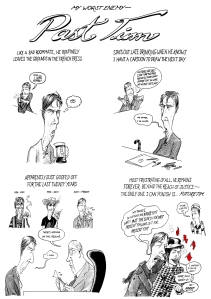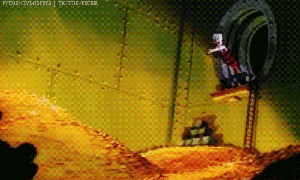 We Learn Nothing by Tim Kreider
We Learn Nothing by Tim Kreider
While I was reading this book – in a faculty meeting, I have to confess – my colleague looked over, looked at the title and remarked something along the lines of, “That’s completely against what we do here.” I just shrugged, flicked to the next page, and went on reading, as it would have taken too long to explain right there, to say nothing of outing me as someone who wasn’t paying what might be called “strict attention” to what was being presented at the time.
 It is true that, as teachers, we might recoil from the idea that we learn nothing. After all, if that is true, then what are we even doing here? It might seem that some of our students have chosen this motto as the guiding principle for their years of secondary education, but still and all, we like to believe that they come out of this school having learned something – if only how to bullshit the teacher into thinking you’re smarter than you really are.
It is true that, as teachers, we might recoil from the idea that we learn nothing. After all, if that is true, then what are we even doing here? It might seem that some of our students have chosen this motto as the guiding principle for their years of secondary education, but still and all, we like to believe that they come out of this school having learned something – if only how to bullshit the teacher into thinking you’re smarter than you really are.
Kreider isn’t talking about book learnin’ here, though. He’s not talking about learning how to do math or why the sun shines or how to make a delicious pie. Those are indeed things we can learn, and should learn. What he’s talking about are the things we fail to learn in life, the big-scale decisions about love and family and politics, where no matter how badly we screw up, we always seem ready – eager, even – to stand up, brush ourselves off, and screw up again.
He begins the book with a statement that not many of us can make: “Fourteen years ago, I was stabbed in the throat. This is kind of a long story and less interesting than it sounds.”
 Kreider goes on to say that there is an expectation that getting stabbed in the neck and nearly dying is the kind of thing that should make a person re-evaluate his life. Perhaps gain some perspective on the things that are important and those that are merely trivial. And while there was a time where he looked at the world anew, eventually he reset back to where he was before his brush with death. Yelling in traffic, getting impatient with other people, fixating on things that were in no way good to fixate upon.
Kreider goes on to say that there is an expectation that getting stabbed in the neck and nearly dying is the kind of thing that should make a person re-evaluate his life. Perhaps gain some perspective on the things that are important and those that are merely trivial. And while there was a time where he looked at the world anew, eventually he reset back to where he was before his brush with death. Yelling in traffic, getting impatient with other people, fixating on things that were in no way good to fixate upon.
In short, after the ephemeral nature of life was made clear, he eventually went back to living as though nothing had changed, simply because one cannot live in a constant state of gosh-wow bliss all the time.
Through this collection of funny, touching, and thoughtful essays, Kreider looks at the lessons he just doesn’t seem to want to learn. He talks about the women who have broken his heart, and how given the chance, he’d let them do it again. He reminisces lovingly over his extended youth of drunkenness and adventure, knowing that it wasn’t the best way to spend so many years, but at the same time knowing he wouldn’t trade them in for a more conventional life. He lets us in on the dark secret of the crazy, pathological uncle that he tried to help despite his mother’s insistence that he stay as far away as he can, about his attempts to infiltrate the Tea Party just to find out if it was crazy as we all thought it was, and about letting his anger and frustration have free rein as he drew cartoons during the Bush Years.
 In short, Kreider is just as aware of his flaws as he is unable to correct them. But it’s not his fault, really, as these are flaws that we all have. They’re glitches in our reasoning and gaps in our self-knowledge that we couldn’t fix even if we wanted to. They’re part of the human drive towards self-destruction – potent in some, less so in others – that cause us to make irrational decisions that we know we’ll regret in the fullness of time. While my life may not have been quite as exciting and turbulent as Kreider’s, I could still see in his stories the same kind of willful ignorance of shortcomings that has sabotaged many a good thing in my own life.
In short, Kreider is just as aware of his flaws as he is unable to correct them. But it’s not his fault, really, as these are flaws that we all have. They’re glitches in our reasoning and gaps in our self-knowledge that we couldn’t fix even if we wanted to. They’re part of the human drive towards self-destruction – potent in some, less so in others – that cause us to make irrational decisions that we know we’ll regret in the fullness of time. While my life may not have been quite as exciting and turbulent as Kreider’s, I could still see in his stories the same kind of willful ignorance of shortcomings that has sabotaged many a good thing in my own life.
But as bad as all that sounds, they make us who we are. Kreider wouldn’t be who he is and do the things he does if it weren’t for the events that shaped him. The decisions he made throughout his life – the bad and the good – molded his personality, gave him purpose, and made him the person that he is. The same can be said for all of us. We have our weaknesses, our foibles, our neuroses, many of which are prime impediments to having what we imagine to be a good life. What we can change, we should. But those things that we cannot change about ourselves are perhaps the things we should embrace. They are the things that keep us humble and human, and as long as we know they’re there, well… maybe they won’t do too much damage.
——-
“The Soul Toupee is that thing about ourselves we are most deeply embarrassed by and like to think we have cunningly concealed from the world, but which is, in fact, pitifully obvious to everybody who knows us.”
– Tim Kreider, We Learn Nothing
The Pain Comics (not entirely work-safe)
We Learn Nothing on Amazon.com





































